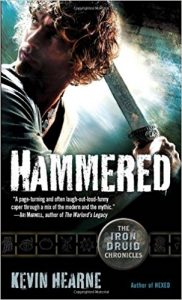 To Gaze Upon Wicked Gods (Gods Beyond the Skies, #1) by Molly X. Chang
To Gaze Upon Wicked Gods (Gods Beyond the Skies, #1) by Molly X. Chang Narrator: Natalie Naudus
Format: audiobook, eARC
Source: supplied by publisher via Edelweiss, supplied by publisher via Libro.fm
Formats available: hardcover, paperback, ebook, audiobook
Genres: coming of age, dystopian, epic fantasy, historical fantasy, science fiction, space opera
Series: Gods Beyond the Skies #1
Pages: 368
Length: 10 hours and 41 minutes
Published by Del Rey, Random House Audio on April 16, 2024
Purchasing Info: Author's Website, Publisher's Website, Amazon, Barnes & Noble, Kobo, Bookshop.org, Better World Books
Goodreads
She has power over death. He has power over her. When two enemies strike a dangerous bargain, will they end a war . . . or ignite one?
Heroes die, cowards live. Daughter of a conquered world, Ruying hates the invaders who descended from the heavens long before she was born and defeated the magic of her people with technologies unlike anything her world had ever seen.
Blessed by Death, born with the ability to pull the life right out of mortal bodies, Ruying shouldn’t have to fear these foreign invaders, but she does. Especially because she wants to keep herself and her family safe.
When Ruying’s Gift is discovered by an enemy prince, he offers her an impossible deal: If she becomes his private assassin and eliminates his political rivals—whose deaths he swears would be for the good of both their worlds and would protect her people from further brutalization—her family will never starve or suffer harm again. But to accept this bargain, she must use the powers she has always feared, powers that will shave years off her own existence.
Can Ruying trust this prince, whose promises of a better world make her heart ache and whose smiles make her pulse beat faster? Are the evils of this agreement really in the service of a much greater good? Or will she betray her entire nation by protecting those she loves the most?
My Review:
I picked this up because I had the opportunity to get the audiobook from Libro.fm, saw that the narrator, Natalie Naudus, is one of my faves, looked at the summary and thought to myself that this had terrific possibilities and figured I’d be in for a decent if not outright excellent listening/reading time.
It was not to be. It was not to be so hard that I bailed on the audio at the 30% mark and it’s not the narrator’s fault. Really, truly, seriously, it’s not her fault. Natalie Naudus, as always, does a great job with the first person perspective of a protagonist who is expected to be kickass or at least grow into that role. (In this case, it may have been a bit too good of a job, as it felt like I was right there with her in a story where I’d have much preferred to be at a remove or ten.)
That decent to excellent time is not what I got. What I got for that first 30% felt like torture porn, and experiencing that neverending torment from inside the character’s own head was literally more than I could take. To the point where, if you’ve followed my comments about the book I flailed and bailed on that set nearly a whole week of reviews off-kilter, you’ve found it. This was it.
And damn was I surprised about that.
So I flailed, and bailed – also ranted and raved (not in a good way) – but in the end I finished in text. Because when I looked at the text to see where I stopped the audio, to figure out if the situation got redeemed at all, I learned that in the very next sentence – which of course I couldn’t see in the audio – the thing that nearly made me turn this book into a wallbanger in spite of a) the potential for having to replace my iphone and b) I was driving – didn’t actually happen.
Not that the character and I hadn’t already been tortured plenty at that point. But it was enough to bring me back if only to find out whether the situation got better – or worse.
The answer, as it turned out, was both.
Escape Rating D: If The Poppy War and Babel had an ugly, squalling bookbaby, To Gaze Upon Wicked Gods would be it. I loved The Poppy War, but had deeply serious issues with Babel which pretty much sums up my feelings about To Gaze Upon Wicked Gods in a desicated, unsightly, possibly even poisonous nutshell.
And that requires some explanation. Possibly a whole lot of it.
This story sits uneasily on a whole lot of crossing points. It’s right on the border between YA and Adult AND it’s at the intersection of historical fantasy with science fiction as well as at least hinting at being a romantasy – which it absolutely is not in spite of those hints in the blurb – even as it turns out to be post-apocalyptic and utterly dystopian in ways that are not hinted at anywhere at all.
And it’s torture porn. By that I mean that the entire first third of the story focuses on a protagonist whose entire life seems to be made of various axes on which she is ground, tortured and punished.
She’s female in a society that makes her property of the male head of household – in a line where those men squandered the family fortune on gambling and drugs one after another. She has magic powers that make her a target for people who want to use her gifts until those gifts use her up – and people who want to destroy her where she stands for a gift that many deem anathema.
Her entire world is under the boot heel of an overwhelming empire – in this I believe the story is intended to reference the Opium Wars and their oppressors are intended to stand in for the British Empire even if they are called Romans.
That her sister is addicted to a substance named “Opian”, provided by the Romans and engineered by the Romans to bring their society down even faster adds to that resemblance as well as to the protagonist’s torture.
That she’s 19, her sister’s and her grandmother’s only real support, and that her cultural conditioning has her blaming herself for everything wrong in their lives – including the invasion by the Romans before she was even born – is just terrible icing on an already unsightly cake overflowing with oppression and self-flagellation.
Ruying, her family and her whole entire world are in deep, deep trouble with no way out that anyone can see. I got that. I got that LONG before the story didn’t so much come out of the mire as it did finally start sloshing through the muck to the even more epically fucked up political shenanigans that are at the heart of everything that’s gone wrong for Ruying’s people.
Once the story finally, FINALLY started to reveal what was really happening and why and how, the situation got more interesting even as Ruying wallowed even more deeply in her personal angst and kept right on torturing herself every literally bloody step of the way.
At the very, very end, after all the blood and gore and guts and not very much plot movement forward, the story finally shows a glimpse of the light at the end of the tunnel, reveals that the light is an oncoming train, and at least displays a glimmer of a hint of action in this book’s sequel, titled either Immortal the Blood or To Kill a Monstrous Prince, which will be coming out this time net year.
This reader, at least, has no plans to be there for it. I’ve been tormented enough. Your reading mileage (and/or listening mileage) may vary.

 Funny Story by
Funny Story by  Escape Rating A: I started out listening to this one, and that’s probably what got me over the hump of the early chapters. This is one of those stories that, of necessity, has a very hard start. We meet Daphne just after very nearly the entire life she had planned crashed and burned. She’s wallowing in a whole lot of angst and regret and self-recrimination, nearly buried by the weight of her emotional baggage piling up all around her. Listening to the excellent narrator makes the listener feel like they are literally inside Daphne’s mostly despairing head and it’s a realistically well-portrayed terrible place to be.
Escape Rating A: I started out listening to this one, and that’s probably what got me over the hump of the early chapters. This is one of those stories that, of necessity, has a very hard start. We meet Daphne just after very nearly the entire life she had planned crashed and burned. She’s wallowing in a whole lot of angst and regret and self-recrimination, nearly buried by the weight of her emotional baggage piling up all around her. Listening to the excellent narrator makes the listener feel like they are literally inside Daphne’s mostly despairing head and it’s a realistically well-portrayed terrible place to be. That Peter ultimately gets the shaft all the way around turned out to be merely the icing on a very tasty cake of a book – or perhaps that should be the slathering of cheese and jalapenos on a fresh, hot serving of Petoskey fries. The part that makes a good thing just that much better.
That Peter ultimately gets the shaft all the way around turned out to be merely the icing on a very tasty cake of a book – or perhaps that should be the slathering of cheese and jalapenos on a fresh, hot serving of Petoskey fries. The part that makes a good thing just that much better. The Wager: A Tale of Shipwreck, Mutiny and Murder by
The Wager: A Tale of Shipwreck, Mutiny and Murder by 
 Trapped (The Iron Druid Chronicles, #5) by
Trapped (The Iron Druid Chronicles, #5) by  After all, back in
After all, back in  Escape Rating B+: Like all of the
Escape Rating B+: Like all of the  Bacchus is after him because Atticus killed a whole bunch of his baccantes back in
Bacchus is after him because Atticus killed a whole bunch of his baccantes back in  Fair warning, it ends on a cliffhanger of truly epic proportions! But that’s OK, because I’ve already got
Fair warning, it ends on a cliffhanger of truly epic proportions! But that’s OK, because I’ve already got  Tricked (The Iron Druid Chronicles, #4) by
Tricked (The Iron Druid Chronicles, #4) by  In
In  As snarky as Atticus is, this story is still much darker in tone than the first two books in the series,
As snarky as Atticus is, this story is still much darker in tone than the first two books in the series,